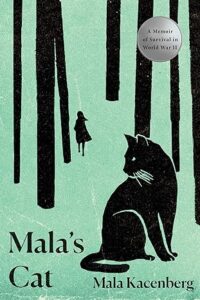Mala’s Cat by Mala Kacenberg; New York: Pegasus Books Ltd, (c) 2022; ISBN 9781639-363827, 306 pages, available on Amazon
By Eva Trieger

 RAMONA, California –Tarnogrod is a small pastoral village in the very heart of Poland. It was a picturesque spot on the edge of the forest, about an hour from Lublin. There was a town square flanked by a church, a shul, a beit midrash, a cemetery and an elementary school, behind which Nitka River flowed. Substantial houses and a few cottages lay scattered about the center of town. Just beyond the main square, a few farmers raised chickens and cows for the region.
RAMONA, California –Tarnogrod is a small pastoral village in the very heart of Poland. It was a picturesque spot on the edge of the forest, about an hour from Lublin. There was a town square flanked by a church, a shul, a beit midrash, a cemetery and an elementary school, behind which Nitka River flowed. Substantial houses and a few cottages lay scattered about the center of town. Just beyond the main square, a few farmers raised chickens and cows for the region.
I have never been to Tarnogrod. I know this because my maternal grandmother grew up on one of these farms, and had the job of delivering the butchered meat to her neighbors for miles around. Sadie Wand rode her bicycle several kilometers to bordering towns including Zbylitowzka, Weirzchoslawice, and Wojnice. It was in Wojnice that she delivered meat to the family of Isadore Trieger, who was away in the army. The two would later meet and wed in New York, just after World War I.
However, the memoir I’m going to share began in Tarnogrod in 1927, when a Jewish girl named Mala Szorer, was born into a religious family. At the time about 2,500 Jews lived in the town, comprising 49% of the population. Mala described her childhood as “the happiest I could have hoped for.” That is, until 1939. At the age of twelve Mala’s entire world was turned upside down as “the immaculate boots of Nazi soldiers trampled” her village.
Mala explained why she chose to write her memoir and tell her horrific story. The heroic Holocaust survivor lived to the age of 90, passing away in 2017 but her story was just published in 2022. Szorer said, “We owe it to the dead to keep their memory alive by reminding the world of its responsibility never to forget.” After reading the last page of Mala’s story, I don’t know how anyone possibly could.
Mala recalled that although her father had found better work in Uruguay, there was an absence of a Jewish community there. In order to provide for his children within a rich Jewish culture, he remained in Tarnogrod and worked selling fruit from the numerous local orchards.
Religious observance was so important to Mala, that even though she could not attend a private Jewish school, she kept kosher and said brachot over her lunch at the state school, encouraging her non-Jewish classmates to follow suit! Her sense of community was shaken in 1936 when antisemitism swept through Polish towns. Mala began to feel unsafe at school, at the hands of cruel teachers, no less. It was not uncommon for the German or Polish teachers to cane the children without provocation, and as school was compulsory for boys, there was little Jewish parents could do to protect their innocent sons.
The war became all too real for Mala in 1939 when the German soldiers marched into Tarnogrod, and before her eyes she saw a little Jewish boy shot to death as he ran to tell his parents that the Germans had arrived. Mala’s innate feistiness and her will to learn would not allow her to give up. Though Jews were banned from going to school, Mala and her Jewish friends formed their own school. This training helped Mala refine her Polish accent as well as her ability to read Polish, skills that would later serve her.
One tragedy befell another. It seemed for Mala, her family, and all of Tarnogrod’s Jews, there was no escaping the Germans’ might. As the family starved, Mala and her brother went out to barter what little they had. They were thrilled to have scored some bread and vegetables. On their stealthy return, they were discovered and shot at by the soldiers. Mala played dead and escaped with her life, her brother Yechiel, was not playing. He’d been killed.
About this time Mala’s stray cat became her constant companion. It seemed to accompany Mala everywhere she went, or meet her whenever she returned from scavenging for food. Mala saw the little cat as her angel and named the cat Malach. It seemed regardless of where Mala found herself, an orchard, a barn, the river, the little cat was by her side, keeping her company.
The Nazi occupation and evil plans for the Jews only intensified in 1942. Curfews were imposed, homes searched, all valuables and food taken by the Nazis, families torn apart and countless innocent people killed just for being Jews.
Mala’s memoir tells of so many close scrapes and untenable, unbelievable situations and horrors, but she also shares some encounters that can only be described as divine intervention. And never, she tells readers, did her faith in Hashem ever waver. From every adverse encounter she grew stronger and emboldened. “If I am to survive, I have to start believing that I am very big, and become completely independent, like the animals in the wilds.”
The courageous young woman survived by her wits, at turns posing as a Christian girl sneaking out of the ghetto, as an elderly woman’s distant relative, even changing her name. The author of this page-turning, human memoir described her steadfast belief that Hashem had sent her the little cat to guard over her throughout her ordeal.
In 1946, while living with a series of observant Jewish families in England, Mala was introduced to some yeshiva buchers who’d originated in Tarnogrod. These boys had survived the war in Siberia and while Mala did not make a shidduch with one of them, she did meet her husband to be, and they married in 1949. At this same time, Malach, Mala’s little guardian angel cat disappeared. Coincidence? I’ll let you decide.
According to the Associated Press, as of January 22, 2024, just 245,000 Holocaust survivors remain. The median age of these men and women is 86. Ninety six percent of these survivors were born after 1928 (Grieshaber 2024). In 1939, Poland was home to 3.3 million Jews. After World War II that number dwindled to 300,000. Today Poland has only 10-20,000 Jews.
This memoir is important, well-written and a worthwhile read for children as well as adults. The story is told through the lens of a young girl’s eyes, and while the content is obviously difficult, it is told with integrity and honesty, but is not overly graphic or gory.
*
Eva Trieger is a freelance writer specializing in coverage of the arts. She may be contacted via eva.trieger@sdjewishworld.com
Thank you, Eva, for this poignant and moving account.